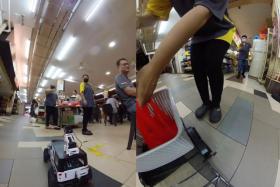Smarter ageing with collaborative robots
Collaborative robots, or cobots, can ease workload of skilled employees, allowing them to focus on less mundane tasks
Recent statistics released by Singapore's National Population and Talent Division paint a sobering picture of Singapore's ageing society - the proportion of citizens aged 65 and above rose from 13.7 per cent in 2016 to 14.4 per cent last year.
The two biggest consequences of the country's ageing population are an increased demand for quality healthcare and a shrinking workforce.
With the rapid pace of demographic change, it will not be long before Singapore feels the impact of both issues.
Robotic automation can offer a viable solution for those affected by this trend, such as healthcare institutions and employers in manpower-scarce sectors.
Some have already adopted robots and various assistive technologies to cope with rising service demands.
One technology that has been put to good use is collaborative robots (cobots) - designed to work alongside people.
Their characteristics have far-reaching benefits for Singapore's ageing population. Compact and lightweight, cobots can fit into small spaces in close proximity with people such as in hospital pharmacies, surgical theatres or labs.
In most cases they do not require physical safety guarding (subject to risk assessment) due to their built-in safety mechanisms, which further minimises the amount of space required.
A key trait of cobots is their user-friendliness. They can be programmed and operated easily. They are highly adaptable for different applications and can be redeployed to automate different tasks rapidly and efficiently.
This can be done by employees, without the need for specialised skills and only takes a few hours instead of days.
For these reasons, cobots are increasingly useful tools capable of assisting people in different ways. Some hospitals have begun deploying cobots to make healthcare delivery more efficient while reducing the workload of professionals.
For example, Changi General Hospital uses a robot picker - a cobot that can pick a range of objects - including fragile items - from a shelf. This reduces the likelihood of accidents and allows staff to focus on catering to patients' needs.
Traditional Chinese medicine (TCM) clinics have adopted cobots to relieve the load on physicians and physiotherapists.
Emma (Expert Manipulative Massage Automation), the cobot used by NovaHealth TCM Clinic, is able to carry out highly articulated movements in delivering customised massages for each patient, mimicking the human touch.
Emma allows the physician to focus on the consultation and treatment planning, lightening the physical effort required of the therapist, and reducing waiting times for patients.
These solutions that automate repetitive, mundane and laborious tasks in healthcare enable healthcare professionals to be more productive and focus on providing holistic care to patients.
By making healthcare work more fulfilling, the sector can attract more people to consider a career in public and community care, where 9,000 more workers are needed over the next three years.
Singapore's overall labour supply is forecast to decline by 1.7 percentage points in the next 10 years and by 2.5 percentage points annually in the subsequent decade.
The food and beverage, retail and hospitality sectors will see a worsening situation when highly skilled workers retire. While some employers are considering rehiring older workers, factors such as shift hours, the need to stand for long durations or perform heavy-lifting duties can deter mature workers.
For re-employment to be effective, jobs need to be re-designed. This could mean leveraging robotic automation to make jobs elder-friendly.
Cobots can be deployed, while the older employees take on higher value responsibilities involving critical thinking or problem-solving.
They can even be paired with cobots to work on certain operations. This will enable employers to tap on the experience and skills of mature workers.
The writer is the South-east Asia and Oceania general manager at Universal Robots.
Get The New Paper on your phone with the free TNP app. Download from the Apple App Store or Google Play Store now


